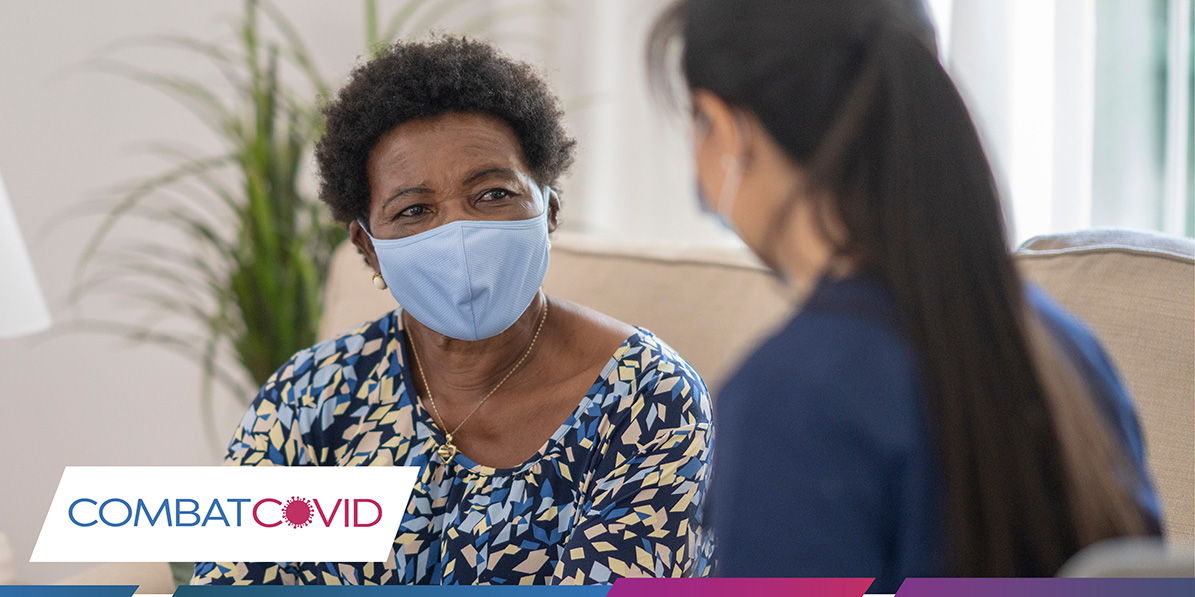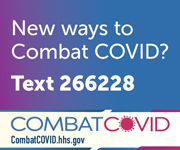If you’ve tested positive for COVID-19, one of the first questions you may have is, What can I do to reduce the risk of getting sicker? The good news is, there are treatments that may reduce that risk. Depending on your age, health history, and how long you’ve had symptoms of COVID-19, you may qualify for a promising form of treatment for the disease. It’s called antiviral treatment.

Some early evidence suggests that treatment can reduce the amount of the SARS-CoV-2 virus (which causes COVID-19) in a person's system. This amount is known as viral load. Having a lower viral load means you may have milder symptoms thereby decreasing the chance of you needing to stay in the hospital.
There are several COVID-19 treatment options available for those who have tested positive and are experiencing symptoms:
- Paxlovid is authorized for the treatment of mild-to-moderate COVID-19 in adults and pediatric patients (12 years of age and older weighing at least 40 kg) with positive results of direct SARS-CoV-2 viral testing, and who are at high risk for progression to severe COVID-19, including hospitalization or death.
- Veklury is approved for the treatment of adults and pediatric patients (28 days of age and older and weighing at least 3 kg) with positive results of direct SARS-CoV-2 viral testing, who are not hospitalized and have mild-to-moderate COVID-19 and are at high risk for progression to severe COVID-19, including hospitalization or death.
- Lagevrio is authorized for the treatment of mild-to-moderate COVID-19 in adults with positive results of direct SARS-CoV-2 viral testing who are at high risk for progression to severe COVID-19, including hospitalization or death, and for whom alternative COVID-19 treatment options approved or authorized by FDA are not accessible or clinically appropriate.
Each of these mAB (monoclonal antibody) treatments has lost authorization due to their ineffectiveness against the Omicron variant:
- On Jan. 24, 2022, HHS and FDA announced that BAM/ETE and REGEN-COV are not currently authorized for use in the US
- On April 5, 2022, HHS and the FDA announced that sotrovimab is not currently authorized in the US
- On Nov. 30, 2022, HHS and the FDA announced that bebtelovimab is not currently authorized in the US
Visit the FDA page Know Your Treatment Options for COVID-19 page to learn more.
How Much Will the Treatment Cost? Is It Covered by Insurance?
Because the federal government has purchased a supply of some antiviral treatments, there may be no cost to the patient for the monoclonal antibody product itself. Depending on your insurance coverage, you may or may not need to pay for a provider to administer the infusion. For many, infusion administration will have no cost. In particular:
- Medicare Medicaid, and Children’s Health Insurance Program (CHIP) are covering all infusion costs. Learn more about coverage of the treatment here.
- For patients covered under commercial insurance plans, costs of infusion may vary, but many large insurers are waiving all costs. Check with your health plan.
- If you do not have insurance, you should ask the treatment facility if there are charges.

mAb Treatments Locations
Please see the map of locations below. mAb treatment must be recommended by a healthcare professional based on a person’s health history and how long they’ve had symptoms of COVID-19. A person can’t simply show up at one of these locations without a referral. Sites that had previously offered mAb may not being doing so now because only Sotrovimab is currently authorized as an mAb treatment.
Currently, there are 45 sites in South Carolina administering mAb treatments. DHEC continues to work with partners to expand the number of mAB infusion locations in the state, and is also reaching out to providers that offer home infusions to expand this treatment, at a doctor’s recommendation, to homebound people.
Additional Resources:
- Combat COVID: Find ways to prevent, treat or help fight COVID-19
- CDC: Treatments Your Healthcare Provider Might Recommend if You Are Sick
- CMS: Monoclonal Antibody COVID-19 Infusion
- CMS: COVID-19 Vaccines and Monoclonal Antibodies
- FDA Authorizes Monoclonal Antibodies for Treatment of COVID-19 (casirivimab and imdevimab)
- FDA authorizes bamlanivimab and etesevimab monoclonal antibody therapy for post-exposure prophylaxis (prevention) for COVID-19
- FDA Authorizes Additional Monoclonal Antibody for Treatment of COVID-19

